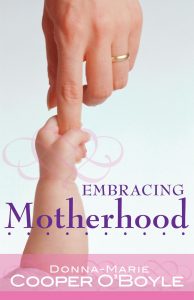Embracing Motherhood
 When I gave birth to my first child I lived more than 200 miles from my mother. Frequent phone calls were neither part of our tradition nor feasible in my new family’s budget, so I didn’t have many opportunities to ask my mother for advice. I read Dr Spock, but his book was not my gospel.
When I gave birth to my first child I lived more than 200 miles from my mother. Frequent phone calls were neither part of our tradition nor feasible in my new family’s budget, so I didn’t have many opportunities to ask my mother for advice. I read Dr Spock, but his book was not my gospel.
My best resource was a friend with one child a year older than mine and a second child on the way. She and her husband belonged to our parish and our Christian Family Movement group, so we exchanged not only child-rearing wisdom but also faith.
As I opened the pages of “Embracing Motherhood,” by Donna-Marie Cooper O’Boyle, I wondered who today’s busy young mothers go to for advice. Few connect via church groups or neighborhood coffees. Do they find wise women via Facebook or search engines? Does anyone use a printed book anymore for parenting advice?
Who is likely to read “Embracing Motherhood”? After finishing the book’s final pages, I concluded that the typical reader of this book is apt to be a faithful Catholic woman seeking support, encouragement and ideas for raising children in a devout household.
Donna-Marie Cooper O’Boyle liberally cites Pope John Paul II, especially from his writings about the family. In “Familiaris Consortio,” the late Holy Father’s 1981 seminal document on the family, he calls the family a “church in miniature” (“ecclesia domestica”), a domestic church in communion with the diocesan and universal church. John Paul II calls families to “become what you are,” an “intimate community of life and love.”
Throughout his pontificate he exhorted family members to fulfill their fourfold mission, a “specific and original” expression of the church’s mission. Pope John Paul II noted in “Familiaris Consortio” that respect and love for the family includes giving back “its reasons for confidence in itself, in the riches that it possesses by nature and grace.”
While Cooper O’Boyle’s message is predominantly encouraging, and she says her book is not about the perfect family, at times she seems to indicate that being church depends upon parents, especially the mother, carrying out “shoulds,” “oughts” and “musts.”
Given the title, it is obvious that “Embracing Motherhood” has a positive outlook. Its basic concept is excellent, acknowledging that motherhood is not a condition to be endured or perfected but to be embraced, as one embraces a beloved with both arms. Motherhood is a vocation, a sacred calling and a privilege.
Cooper O’Boyle addresses issues important for mothers and explores them from multiple angles. A chapter called “First and Foremost Educator” is a good example. Its 16 pages address parents’ responsibilities to educate their children, contemporary temptations, parental unity, prayerful example, cultural influences and relationships with adult children. As with all the other chapters, this one concludes with a few simple reflection questions and a brief “homespun” prayer.
At times while reading this book I sensed a tone characterized by a comment opening the book’s second chapter. There the author refers to her own domestic church as “an oasis to retreat to from the craziness of the world.” Is not the church “ín” the world rather than apart from it, striving to influence society rather than withdraw from it? So also the domestic church, the family, lives in the world and does not retreat from it.
A sheltering home and caring relationships are essential for family health and children’s well-being, which Cooper O’Boyle emphatically conveys in her book. She also states that she is not advocating a return to “some outdated style of human living” but to “the roots of human development and human happiness.”
Nurturing a family in this world while fostering our children’s ability to deal successfully with the world’s perils is an art, or what Cooper O’Boyle refers to as “power and grace.”
About the reviewer
Mary Ann Paulukonis is a mother and grandmother, as well as freelance writer, speaker and consultant for leadership and ministry
Disclaimer: Book reviews do not imply and are not to be used as official endorsement by the USCCB of the work or those associated with the work. Book reviews are solely intended as a resource regarding publications that might be of interest to For Your Marriage visitors.




